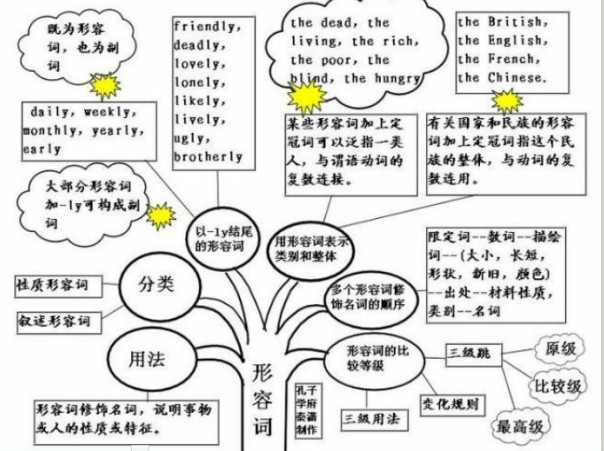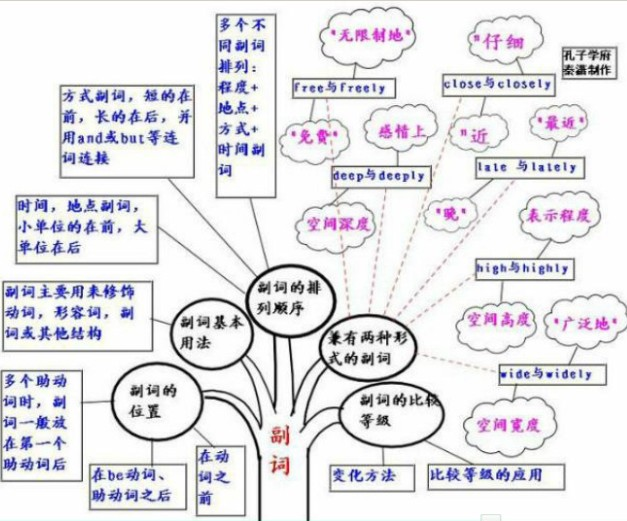本试题 “单词拼写。1. The proposal _____ (支持) by a large majority of the teachers was accepted.2. We were shocked by the ________ (声明) that the mayor wa...” 主要考查您对单词、词组
形容词的最高级
形容词
副词
一般过去时
等考点的理解。关于这些考点您可以点击下面的选项卡查看详细档案。
- 单词、词组
- 形容词的最高级
- 形容词
- 副词
- 一般过去时
单词和短语:
由两个以上的词组成的,没有完整的句子结构,但又有一定的语法和逻辑关系的词的组合就是短语或词组。短语又包括固定短语,和自由短语。
比如说,put off (推迟),look up(查阅,查字典)have a heavy heart(心情沉重)…我们都习惯称为短语或词组(phrase)。put off是由一个动词和介词组成的,但他在句子中充当一个动词的作用,也就是说在这个词组中,put 是词头(head of the phrase) 所以它是动词词组,或动词短语。
题型特点:
对于英语学习来说,词汇是基础,掌握并灵活运用英语单词对学好英语至关重要,它会直接影响到我们的听、说、读、写能力。从高考单词拼写试题来看,单词拼写把单词放在句中考查,不仅是单词拼写,而且还要考查单词的形式,即将单词的写与用结合起来。这一点主要是要求学生对词汇的应用要有所掌握,体现了学以致用,从而根据语境选用适当的词。因此,答题时必须认真阅读全句,弄懂句意,在理解的基础上考虑选用适当的词汇。所考词汇多为多音节词,多数单词均有不同的变化形式,一般不少于4个字母。
题型种类:
1、句子中被考查的单词突出,画横线,横线标有该单词的首字母,要求学生写出该单词的正确形式。
2、句子中被考查的单词突出,画横线,横线后的括号内注有汉语,要求学生写出该单词的正确形式。
例题解析:
(一)读懂句意,确定单词。
例如:The f____day of the week is Sunday. 该句意为“一周的第一天是星期天”,需要填的词的首字母是“f”,根据常识和序数词有关知识应填“第一”,故填 first。此类题还可考月份。
例如::September is the n ____ month of the year (答案:ninth)
(二)瞻前顾后,确定形式写出单词后,还要注意分析该单词是否需要变化形式。现分类说明如下:
1、名词一般考虑单、复数和所有格。
例1:Do you like white?We have shirts of different c____. 根据句意,可确定单词为“color”,通过前面的shirts和different两词可确定此处应用colors。
例2:September10 this T____Day. 根据句意,确定单词“Teacher”,它与Day之间存在所有格关系,将Teacher变为复数,再变为所有格,应填Teachers'。
2、形容调和副词这两类词学生极易混淆,做题时应仔细分析,慎重选择究竟用哪类词,有时还要考虑到形容词和副词“级”的变化。
例1:He was very a____with the man upstairs and began to shout, "Stop singing!" 根据句意,此处应填形容词原级angry。
例2:On Sundays, Children play h____in the park. 此处应填副词happily,副词修饰动词。
3、动词动词变化形式较为复杂,一般有五种:动词原形、第三人称单数形式、现在分词,过去式和过去分词。可综合考查学生运用英语知识的能力。
例1:Thank you very much for l____me your bike. 介词后动词用-ing形式,故填lending。
例2:When he was ten, he became i____in maths. become interested in 为固定词组,意为“对……感兴趣”,故此处应填interested。
4、数词注意确定用基数词还是序数词。
例1:There are t____months in a year. 此处应用基数词twelve。
例2:December is the t____month of the year. 此处应填序数词twelfth。
5、代词主要从人称代词、物主代词、反身代词、不定代词和疑问代词几方面考虑,有时还要考虑用单数还是用复数。
例1:Help y____to some fish, Jim. 根据句意,此处应用yourself.
例2:"Help y____to some fish, please." Mrs Green said to the twins. 根据句意,thetwins为复数,故填yourselves。
6、连词若前后两个词或句子存在转折、因果、并列、选择等关系,一般应填连词。
例1:She didn't go to school yesterday b____she was il1. 从句和主句互为因果关系,故填because。
例2:The football match still went on t____it was raining heavily. 该从句为让步状语从句,故应填though。
解题技巧:
以下是解单词拼写的基本程序:首先要仔细审题,明确大意。在句子缺词的情况下,尽量弄懂句子大意并根据已给出的语境,判断出所缺的单词,试将该单词放入句子当中,看是否能使句子完整,句意明确。注意词性,写出词形。在解题过程中,要特别注意根据句子中所缺成分,判断所缺单词的词类。
1、名词,就要注意单复数;
2、动词,就要注意主谓一致、时态和语态的一致性;
3、形容词和副词,就要注意形容词和副词之间的转化规则;
4、词组和短语,就要注意固定搭配。
重读句子,验证答案。完成拼写后,要把句子重读一遍,检查句子是否通顺,单词拼写是否准确无误,单词形式是否正确,如名词的数、格,动词的时态、语态、语气和非谓语形式,形容词、副词的级等。这一步很重要,因为差之毫厘,谬以千里。总而言之,高考单词拼写题既考查学生的词汇量,又考查学生在特定的语境中灵活运用词汇的综合应变能力。要想提高得分率,绝非一日之功。正如谚语所说:“Rome was not built in one day”。所以,考生应该以命题特点为指导,在平时的复习中运用构词法知识多读、多记、多练,并增强语感,辅以行之有效的解题方法,才能熟练掌握,灵活运用,避免出错。
题型拓展:
1、单纯的翻译题,考查考生对单词的记忆。例句:The little girl is wearing a____ (粉红色的)dress. (正确答案:pink)
2、根据语境要求,填入所写单词的适当形式。
例句:The story was first written in English and later____ (翻译) into Chinese.(正确答案:translated)
3、从词在拼写上有可能存在的“盲点”(相对难写、难记)考虑命题。
例句:The book gives a short ____(描述) of the city.(正确答案:description)
4、在有可能出现多个近似答案的情况下,对词的用法进行甄别。
例句:Very few people ____(成功) in losing weight these days.(正确答案:succeed)
5、从词在用法上有可能存在的“盲点”(相对少见的用法,在一般规律中考查特殊)考虑命题。
例句:All the boys were standing up ____(笔直). (正确答案:straight)
6、侧重选择多音节词汇(构成各单词的字母数一般都超过了7个)命题,考查考生对多音节词汇的把握程度。
例句:One of ____ (邻居) kept a very beautiful garden. (正确答案:neighbours或neighbors)
7、侧重选择词义较为生僻或使用率偏低的词汇命题,考查考生对单词拼写记忆的广泛程度。
例句:He turned on the television set hanging from the____ (天花板). (正确答案:ceiling)
8、侧重从词音与词形不相吻合的部分命题(包括不发音字母),考查考生对单词拼写记忆的准确程度。
例句:I usually just have a____ (三明治) for lunch. (正确答案:sandwich)
9、能根据语境的要求,将所给的中文提示(该提示给人以名词或动词的假象)转译成正确的英语表现形式。
例句:I changed into my sports shoes so that I could walk more____(舒服). (正确答案:comfortably)
10、对近义词不同搭配用法的一般常识,在有可能出现多个答案的情况下,对词的用法进行反复推敲,考生应对最常用词汇的易混易错现象给予注意。
例句:A fence at the back of garden (分开) us from the neighbours.(正确答案:separates或separated)
形容词最高级概念:
表示“三者、三者以上之中之最”,用形容词的最高级句式,形容词最高级前必加冠词the。
形容词最高级用法:
1)the+最高级+比较范围:
如:The Sahara is the biggest desert in the world.
形容词最高级前通常必须用定冠词the,副词最高级前可不用。形容词most前面没有the,不表示最高级的含义,只表示“非常”。
如:It is a most important problem.=It is a very important problem.
注意:使用最高级要注意将主语包括在比较范围内。
如:(错)Tom is the tallest of his three brothers.
(对)Tom is the tallest of the three brothers.
2)下列词可修饰最高级,by far, far, much, mostly, almost :
如:This hat is nearly/almost the biggest.
注意:
1、very可修饰最高级,但位置与much不同。
如:This is the very best.
This is much the best.
2、序数词通常只修饰最高级。
如:Africa is the second largest continent.
3)句型转换:
如:Mike is the most in telligent in his class.
Mike is more intelligent than any other students in his class.
4)“否定词语+比较级”,“否定词语+so…as”结构表示最高级含义:
如:Nothing is so easy as this.=Nothing is easier than this.=This is the easiest thing.
形容词最高级用法特别提示:
1、表示“最…之一”的句式:one of the+.最高级+名词复数:
如:Jim is one of the best students in his class.
Su zhou is one of the most beautiful cities in China.
2、“the+序数词+最高级”表示“第几个最…”:
如:The Yellow River is the second longest river in China.
3、当最高级前有物主代词或名词所有格时,不加the;
如:Monday is my busiest day.
Jack is Jim's best friend.
4、比较级与最高级的转换:
如:He is taller than any other boys in his class.
He is the tallest boy in his class.
形容词最高级用法的注意点:
1)最高级后常有介词短语、从句或所有格来表比较范围。
2)最高级前有作定语的物主代词、指示代词或名词所有格等时,不再加定冠词the。
3)形容词最高级用在oneof结构中,这时最高级后面的名词要用复数。
4)形容词最高级有时单独使用,没有比较的范围。
如:Greece's best writers lived in ancient Athens. 希腊最好的作家居住在古雅典。
The most violent have winds of more than 400kilometres per hour. 最猛烈的风力达到每小时400千米以上。
5)形容词最高级前有时有定语或状语修饰。
如:Japan's second largest city is Osaka. 日本的第二大城市是大阪。
Here in Vancouver,you're in Canada's warmest part. 这里是温哥华,加拿大最暖和的地方。
Tai Lake is nearly the biggest in EastChina. 太湖在华东几乎是最大的。
6)形容词最高级有时有特殊用法。
①most同形容词连用而不用the时,表示“非常,十分”。
②当形容词最高级作表语,而又不与别的人或物作对比时,不用the。
如:The supermarket is busiest on weekend. 这个超市周末最忙。
③用作宾语补足语的形容词最高级前的the常省略。
如:We feel it most difficult to write a composition in English. 我们觉得用英语写作文最难。
I think it best not to ask him about it now. 我想现在还是不要向他询问此事为妙。
④形容词最高级还可用在某些短语中。
如:You can at least go and get your jacket. 你至少可以去拿你的夹克衫。
I guess it should only cost at most fifty dollars. 我猜想它最多值五十元。
We'll do our best to make the transportation unimpeded. 我们将尽最大努力使交通畅通。
形容词最高级变化有规则和不规则两种:
1、规则变化:
|
构成 |
原级 | 最高级 |
| 单音节以及少数双音节的词后面直接加-est | tall | tallest |
| short | shortest | |
| 以不发音的e结尾只加-st | large | largest |
| “以辅音字母+y”结尾的词改y为i,再加-est | happy | happiest |
| easy | easiest | |
| 以一个元音加一个辅音字母结尾的单音节词(即重读闭音节词),双写结尾的辅音字母, 再加-est | hot | hotter |
| big | bigger |
注:大部分双音节词和多音节的词(即音标中含有三个或三个以上元音音素的词),要在前面加more,most。
如:interesting→most interesting
expensive→most expensive
特别提醒:
1、以形容前缀un构成的三音节形容词不适合上述情况:
如:unhappy→unhappiest,
2、以形容词+ly构成的副词要在前面加 more,most:
如:slowly→most slowly
2、不规则变化:
|
原级 |
最高级 |
| good | best |
| bad/ill | worse |
| little | least |
| many/much | most |
| far | farthest/furthest |
| old | oldesteldest/ |
形容词最高级用法解密:
1、形容词最高级前必须加定冠词the,但如果最高级前有物主代词、指示代词、名词所有格等修饰时,则不用定冠词。
如:My oldest daughter is 16 years old. 我最大的女儿16岁。
2、形容词最高级常与由介词in或of引导的表示范围的短语连用。若介词后的名词或代词与句中的主语是同一事物时,则用of短语;
当只说明是在某一空间、时间范围内的比较时,则用in短语。
如:This apple is the biggest of all. 在所有的苹果中,这个苹果最大。
He is the youngest in his class. 他在他班里年龄最小。
3、形容词最高级前可用序数词限定,共同修饰后面的名词,其结构为:“the+序数词+形容词最高级+名词”。
如:Hai nan is the second largest island in China. 海南是中国的第二大岛。
4、形容词最高级的意义还可以用比较级形式表达。常见的有:
(1)形容词比较级+than any other+单数名词。
如:This is more difficult than any other book here. (=This is the most difficult book of all.) 这些书当中这本最难。
(2)形容词比较级+thantheother+复数名词。
如:Asia is bigger than the other continents on the earth. 亚洲是地球上最大的洲。
5、形容词最高级前若有不定冠词a,这时,它不表示比较,而表示“非常”的意思。
如:Spring is a best season. 春天是一个非常好的季节。形容词最高级前通常要加定冠词the,而以下几种情况一般不需要加定冠词the:
(1)形容词最高级前有序数词、物主代词、指示代词或名词所有格等限定词修饰时,最高级前不用the。
如:The Yellow River is the second longest river in China. 黄河是中国第二长河。
(2)形容词最高级在句中作表语而比较范围又不明确时,最高级前不用the。
如:They are happiest on Saturdays. 他们在星期六最快乐。
(3)如果两个形容词最高级并列修饰同一个名词时,第二个形容词最高级前不加the。
如:He is the youngest and tallest boy in his class. 他是班上年龄最小、个子最高的男孩。
(4)如果形容词最高级用来加强语气,作“十分;非常”之意时,前面不加the。但形容词最高级作单数名词的定语时,可用不定冠词a/an。
如:That book is most interesting. 那本书非常有趣。
(5)作宾语补足语的形容词最高级前不加the。
如:I found it most difficult to get to sleep. 我发现入睡最难。
(6)在一些固定用法中,最高级前通常省略the。
如:With best wishes for you. 向你致以最美好的祝愿。
形容词的概念:
形容词(adjective),简称adj.或a,形容词用来修饰名词或代词,表示人或事物的性质、状态,和特征的程度好坏与否,形容词在句中作定语、表语、宾语补足语。通常,可将形容词分成性质形容词和叙述形容词两类,其位置不一定都放在名词前面。
形容词的作用与位置:
形容词是用来修饰名词的,常被放在名词前作定语,或放在系动词后面作表语。以下属几种特殊情况,须牢记;
(1)形容词短语作定语,定语后置。
如:a language difficult to master,
a leaning tower about 180 feet high
(2)表语形容词(afraid、alike、alone、asleep、awake、alive等)作定语,定语后置。如a man alive。有些表身体健康状况的形容词如well、faint、ill只作表语。sick既可作表语又可作定语,ill如作定语意为“bad”。
(3)用作定语,修饰由不定代词one、no、any、some和every构成的复合词如anything、something等时,通常后置。
如:I have something important to tell you.
(4)else常用作疑问代词和不定代词的后置定语。
(5)enough、nearby修饰名词前置或后置,程度副词一般位于形容词、副词前面,enough修饰形容词、副词时,必须后置。
(6)几个并列的形容词作定语,其语序通常为:限定语(The、A)+描绘性形容词+size(大小)+shape(形状)+age(年龄、时间)+color(颜色)+origin(国籍、来源)+material(材料)+purpose(目的)+名词。
口诀:
限定描绘大长高,形状年龄和新老;颜色国籍跟材料,作用类别往后靠。
如:a heavy black Chinese steel umbrella,
the man's first tow interesting little red French oil paintings
形容词的用法:
1、形容词修饰名词,说明事物或人的性质或特征。通常,可将形容词分成性质形容词和叙述形容词两类,其位置不一定都放在名词前面:
1)直接说明事物的性质或特征的形容词是性质形容词,它有级的变化,可以用程度副词修饰,在句中可作定语、表语和补语。例如:hot热的。
2)叙述形容词只能作表语,所以又称为表语形容词。这类形容词没有级的变化,也不可用程度副词修饰。
大多数以a开头的形容词都属于这一类。例如:
afraid害怕的。(错)Heisanillman. (对)Themanisill. (错)Sheisanafraidgirl. (对)Thegirlisafraid.
这类词还有:well,unwell,ill,faint,afraid,alike,alive,alone,asleep,awake等。
3)形容词作定语修饰名词时,要放在名词的前边。但是如果形容词修饰以-thing为字尾的词语时,要放在这些词之后。例如:somethingnice
2、用形容词表示类别和整体:
1)某些形容词加上定冠词可以泛指一类人,与谓语动词的复数连接。如:the dead,the living,the rich,the poor,the blind,the hungry The poorarelosinghope.穷人失去了希望。
2)有关国家和民族的形容词加上定冠词指这个民族的整体,与动词的复数连用。如:the British,the English,the French,the Chinese. The English have wonderful senseofhumor.
以-ly结尾的形容词:
1)大部分形容词加-ly可构成副词。但friendly,deadly,lovely,lonely,likely,lively,ugly,brotherly,仍为形容词。改错:
如:(错)She sang lovely.
(错)He spoke to me very friendly.
(对)Her singing was lovely.
(对)He spoke to me in a very friendly way.
2)有些以-ly结尾既为形容词,也为副词。 daily,weekly,monthly,yearly,early .
如:The Times is a daily paper.
The Times is published daily.
形容词知识体系:

复合形容词的构成:
(1)形容词+名词+ed:
如:kind-hearted 好心的,white-haired 白发的
(2)形容词+形容词:
如:red-hot 炽热的,dark-blue 深蓝的
(3)形容词+现在分词:
如:good-looking 好看的,easy-going 随和的
(4)副词+现在分词:
如:hard-working 勤劳的,fast-moving 快速转动的
(5)副词+过去分词:
如:hard-won 得来不易的,newly-made 新建的
(6)名词+形容词:
如:life-long 终生的,world-famous 世界闻名的
(7)名词+现在分词:
如:peace-loving 爱好和平的,fun-loving 爱开玩笑的
(8)名词+过去分词:
如:snow-covered 白雪覆盖的,hand-made 手工的
(9)数词+名词+ed:
如:four-storeyed 4层楼的,three-legged 3条腿的
(10)数词+名词(名词用单数):
如:ten-year 10年的, two-man 两人的
副词的概念:
副词是指在句子中表示行为或状态特征的词,用来修饰动词、形容词、其他副词、介词短语、非谓语动词乃至整个句子,表示时间、地点、程度、方式等概念。
副词的位置:
1)在动词之前。
2)在be动词、助动词之后。
3)多个助动词时,副词一般放在第一个助动词后。
注意:
a. 大多数方式副词位于句尾,但宾语过长,副词可以提前,以使句子平衡。
如:We could see very clearly a strange light ahead of us.
b. 方式副词well,badly糟、坏,hard等只放在句尾。
如:He speaks English well.
副词的排列顺序:
1)时间,地点副词,小单位的在前,大单位在后。
2)方式副词,短的在前,长的在后,并用and或but等连词连接。
如:Please write slowly and carefully.
3)多个不同副词排列:程度+地点+方式+时间副词。
注意:副词very可以修饰形容词,但不能修饰动词。
改错:(错)I very like English.
(对)I like English very much.
注意:副词enough要放在形容词的后面,形容词enough放在名词前后都可。
如:I don't know him well enough.
There is enough food for everyone to eat.
There is food enough for everyone to eat.
兼有两种形式的副词:
1)close与closely:
close意思是“近”;closely意思是“仔细地”。
如: He is sitting close to me.
Watch him closely.
2)late与lately:
late意思是"晚";lately意思是“最近” 。
如:You have come too late.
What have you been doing lately?
3)deep与deeply:
deep意思是“深”,表示空间深度;deeply时常表示感情上的深度,“深深地” 。
如:He pushed the stick deep into the mud.
Even father was deeply moved by the film.
4)high与highly:
high表示空间高度;highly表示程度,相当于much。
如:The plane was flying high.
I think highly of your opinion.
5)wide与widely:
wide表示空间宽度;widely意思是“广泛地”,“在许多地方”。
如:He opened the door wide.
English is widely used in the world.
6)free与freely:
free的意思是“免费”;freely的意思是“无限制地”。
如:You can eat free in my restaurant whenever you like.
You may speak freely, say what you like.
副词知识体系:

一般过去时的概念:
一般过去时表示过去某个时间里发生的动作或状态;过去习惯性、经常性的动作、行为;过去主语所具备的能力和性格。
一般过去时的用法:
1、表示过去发生的动作或存在的状态,常与表示过去时间的副词如:yesterday,last week,two hours ago等连用。
如:My family moved here five years ago. 我家五年前搬到了这里。
I was born in 1973. 我生于1973年。
2、表示过去一段时间经常或反复发生的动作。这时可与频度副词如:often,usually,always等连用。
如:He always worked in tonight those days. 那些日子他总是工作到深夜。
I often left on business in 1987. 1987年我经常出差。
注:表示“过去经常,而今不再”时,要用usedto.
如:I used to read newspaper after breakfast. 我过去经常早饭后看报纸。(意指现在已不是这样)
The children often swam in this river. 孩子们过去经常在这条河里游泳。
3、表示过去发生的一连串动作。
如:He put down the heavy box, took out the keys, and opened the door. 他放下这沉重的箱子,掏出钥匙开了房门。
注:过去发生的一连串动作,若用and,or,but等并列连词连接,则一律用过去式。
如:They moved the chairs to the table, sat down and began to have supper. 他们把椅子搬到桌边,坐下开始吃饭。
4、在时间和条件状语从句中,用一般过去时表示过去将来的动作。
如:He said that he would let me know as soon as he got the information. 他说他一得到消息就立即让我知道。
Mary told me that she would stay at home if it rained. 玛丽告诉我如果下雨她就呆在家里。
一般过去时的特别用法:
1、句型:It is time for sb. to do sth "到……时间了" "该……了"。
例如:It is time for you to go to bed.你该睡觉了。
It is time that sb.did sth. "时间已迟了" "早该……了"。
例如:It is time you went to bed. 你早该睡觉了。
2、would(had)rather sb.did sth. 表示'宁愿某人做某事'。
例如:I'd rather you came tomorrow. 还是明天来吧。
3、wish, wonder, think, hope等用过去时,作试探性的询问、请求、建议等,而一般过去时表示的动作或状态都已成为过去,现已不复存在。
例如:I thought you might have some. 我以为你想要一些。
比较:Christine was an invalid all her life.(含义:她已不在人间。)
Christine has been an invalid all her life.(含义:她现在还活着)
Mrs. Darby lived in Kentucky for seven years.(含义:达比太太已不再住在肯塔基州。)
Mrs. Darby has lived in Kentucky for seven years.(含义:现在还住在肯塔基州,有可能指刚离去)
注意:用过去时表示现在,表示委婉语气。
1)动词want, hope, wonder, think, intend等。
例如:Did you want any thing else? 您还要些什么吗?
I wondered if you could help me. 能不能帮我一下。
2)情态动词could, would。
例如:Could you lend me your bike? 你的自行车,能借用一些吗?
与“单词拼写。1. The proposal _____ (支持) by a large majorit...”考查相似的试题有:
- 单词拼写1.What's your______(态度)to solving the problem?2. Your early reply will be highly ________(感激).3. She was ...
- 第二节:语法填空: 根据短文内容,在空格中填上合适的单词。(共10分,每空1分)A little old lady went into a pet shop and...
- We must be sure that children in our country should get well ______.A.educate B educating C.education D.educated
- He began to take political science __________ only when he left school.A.strictlyB.trulyC.carefullyD.seriously
- 短文改错假定英语课上老师要求同桌之间交换修改作文,请你修改你同桌写的以下作文.文中共有10处语言错误,每句中最多有两处.错...
- The program will double the amount of money ________ to help pay for child care.A.valuableB.convenientC.comfortabl...
- He is very popular among his students as he always tries to make them ____ in his lectures.[ ]A. interestedB. interes...
- —He has been working________.—No wonder he looks very tired now.[ ]A. sooner or laterB. day and nightC. now and thenD...
- 短文改错At 7: 30 on the morning, we gathered at the school gate and set off on a large bus.An hour later,we arrive at...
- — Ann is in hospital.— Oh, really? I _____ know. I _____ go and visit her.A. didn't; am going toB. don't; wouldC. don...